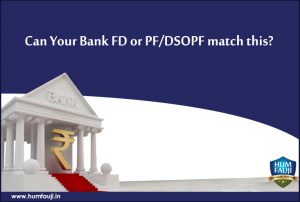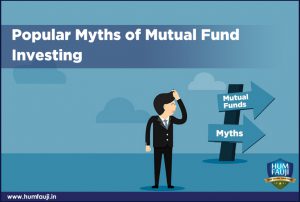
Gift to a loved one? How about a Mutual Fund SIP?
Divesh Kumar has recently retired as a contended man. He hasfulfilled his duties as a devoted father, caring son and loving husband all his life. He now wants to gift something long lasting for his two lovely grandchildren which he and his wife fondly dote on. They both decided to contribute for higher studies for them by contributing some money every month. Their first impulse was to save in a bank Recurring Deposit (RD) but wanted their decision to be validated by us. We heard them out and asked them, “Have you thought of mutual funds for this purpose?” They never had thought so. We explained to them that they had a long time frame for their gift. The gift should actually work for the recipients to create value as they have planned and not be lost to inflation and taxes. In case of any emergent requirement some time later, ...

Can Your Bank FD or PF/DSOPF match this?
We are generally comfortable investing our money in bank FDs, PF/EPF/DSOPF and other fixed income instruments, always smug in the belief that our money is safe and will grow up adequately to meet our aspirations regarding self, spouse and children. However, we neglect the combined damaging effects of Inflation & Taxation from our calculations. If your safer investments are tax-free (generally the PF/EPF/DSOPF, and Insurance policies), they should generate at least 8% per annum to merely neutralise long-term inflation and your money actually grows only if you earn beyond this. If the investments are not tax-free (all your bank and post office instruments including savings accounts, FDs, PO MIS, SCSS and RDs) and say, you are in 30% tax bracket, your investments should give at least 11.43% annualised returns for you to ‘break-even’. For 20% and 10% tax brackets, the minimum returns to break even are 10% and 8.88% respectively ...

MFs your Financial Supermarket
There are a lot of misapprehensions in the minds of most of the people about Mutual Funds. Despite the fact that they are one of the best financial avenues to invest and save while giving a lot of flexibility and convenience to the investor, they have not been able to capture the investing space of a large number of people. My article below in Times of India today (National Edition, Page 7, 09 Dec 2014, Tue) tries to bring out that Mutual Funds are the most versatile financial instruments, for any period of time and purpose while giving you all the flexibility which no other financial instrument can match. You may also look at the link https://humfauji.in/blog on our website to read more about it. (Please enable ‘Display Images Below’ in your browser to see the newspaper clipping) ...

MUTUAL FUNDS CAN BE YOUR FINANCIAL SUPERMARKET
For some unknown reasons, investing in mutual funds in India is almost always taken to be equity investing. This is despite the fact that out of a total of approximately Rs 11 Lakh Crores invested in mutual funds today, 70% is invested in Debt Funds, ie the funds which do not invest in equity markets at all. Consequently, investor perception of mutual funds is of a one horse race and that horse is stock markets. The reality is quite different though. Mutual Fund as a class of investing is, in fact, not one single product unlike bank FDs, stocks or Gold. It is more like a basket which has three products – stocks, debt products and Gold – in all sorts of proportions. An investor can mix-and-match as per his liking and requirement. So a mutual fund can have all three or any two or just one single product as ...

Popular myths of Mutual Fund Investing
Dear Friend, Attached herewith is my article published in Times of India (National Edition, 17 Feb 2015, Tuesday) on various myths that surround investing in mutual funds. A large number of people miss out on this excellent investing avenue due to misconceptions which are contrary to ground realities. Mutual Funds, as an investment are tax-efficient, versatile and very remunerative and can be as safe or as growth-oriented as you desire. You can customise it as per your requirement and comfort and still have money available at your beck-and-call all the time. (Please enable 'Display Images Below' in your browser to see the newspaper clipping). The article can also be accessed at the link http://epaperbeta.timesofindia.com/Article.aspx?eid=31808&articlexml=MYTH-BUSTER-You-dont-need-demat-ac-for-17022015007043 Popular Myths of Mutual Fund Investing Mahesh Singh, 42 years old, is very keen that he should invest his hard-earned money in the best possible manner. He has two children and wants to make the best of the ...

What returns to expect from Debt Mutual Funds
Last of our knowledge series on Debt Mutual Funds below gives out what can you expect from Debt MFs. As you will see, compared to other fixed income products like bank FDs, Post Office schemes, Senior Citizen Savings Scheme etc, Debt MFs are poised to give better returns, are much more tax-efficient, and have much better liquidity and flexibility. Thus, they can be your flagship product for the part of the portfolio where you are looking for safe and tax-efficient wealth creation. _______________________________________________ What kind of returns do Debt Funds offer? Debt funds offer two kinds of income: Dividends & Capital gains Dividends: Debt funds receive interest on the debt securities invested by the fund. This interest can be distributed to the investors of the debt fund as dividends. Dividend distribution is however subject to availability of distributable surplus and approval from the Trustees of the Mutual Fund. Capital gains: ...

Debt mutual funds in India can be broadly categorized based on their investment objectives, maturity profiles, and underlying securities. Here are some common categories of debt mutual funds
Debt funds invest exclusively in fixed-income instruments securities like bonds, debentures, Government securities, and money market instruments such as certificates of deposit (CD), commercial paper (CP), and call money. Here are the different types of debt funds in India: Government Securities (G-Sec) Funds: Invest in government-issued securities such as treasury bills and bonds. These funds carry low credit risk but are sensitive to interest rate movements. Corporate Bond Funds: Primarily invest in corporate bonds issued by companies. The risk and returns vary based on the creditworthiness of the issuing companies. Money Market Funds: Invest in short-term debt instruments such as treasury bills, commercial papers, and certificates of deposit. These funds aim for capital preservation and provide high liquidity. Short-term Funds: Invest in fixed-income securities with a short maturity period, typically less than 1-3 years. These funds aim for stable returns with relatively low-interest rate risk. Medium-term Funds: Invest in fixed-income ...

Diversification of Your Investments- Don’t Put All Your Eggs In One Basket
We frequently come across individuals who are very finance-savvy but have taken a fancy to one particular asset-class and are totally convinced that it is the best one to sail them through their life. This bias is seen mostly in real-estate investments and in equity investments(stocks or shares, as they are variously called). Unmindful of the danger it poses to their long-term goals, they continue to invest all their investible suplus in their favoured avenue without caring about one of the Golden Rules of Investment - Diversification of assets. What is diversification? Diversification means spreading your investments over a number of investment avenues. Why do we need to diversify our investments? Why should we not put it all in only one type of investment which we think is the best? Let’s look at the example below. A man wants to sell eggs to buyers in the city. He will carry ...


